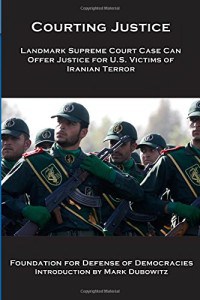Last Updated on July 26, 2022 by ellen
Courting Justice by Mark Dubowitz was an interesting look at a landmark Supreme Court case about Iranian terrorism. My husband and I have always been fascinated with the legal system and enjoy books and movies about how the process works. We enjoy learning about how the legal system works differently in civil, criminal and international cases. When I  was sent a copy of Courtin Justice by Mark Dubowitz, I thought it would be interesting to learn more about how the legal system worked and applied to our overseas relationship with Iran. \any way.
was sent a copy of Courtin Justice by Mark Dubowitz, I thought it would be interesting to learn more about how the legal system worked and applied to our overseas relationship with Iran. \any way.
Posts may be sponsored. This post contains affiliate links, which means I will make a commission at no extra cost to you should you click through and make a purchase. As an Amazon Associate I earn from qualifying purchases.
Courting Justice by Mark Dubowitz
In 2015, we made an agreement with Iran to give them billions of dollars in relief in exchange for constraints on some of their nuclear activity. While we made this agreement, it does not remove any of the prior terrorist activities they’ve committed against our citizens and others. Since we made this relief agreement, Iran has continued to be involved in terrorist activities against United States citizens and against their neighbors. They also continue to support money laundering activities in the Middle East that are illegal.
The Supreme Court heard arguments from American victims of Iranian terrorism who want to collect on judgments that were won from the Central Bank of Iran that are being held in a New York bank. The Central Bank of Iran has appealed the legislation allowing this. The Iranian regime is trying to use the US legal system to prevent the US government from using economic tools to improve US national security.
Courting Justice by Mark Dubowitz was an interesting look at how other countries are trying to use the American legal system to further their own goals and why it’s so necessary that we prevent this from happening. The author explains the history of the Iranian agreement and how Iran has violated this agreement in several ways. The author also shares the Supreme Court brief so that you can get a deeper understanding of the legal ramifications of what’s being done. I wasn’t aware that other countries could use our legal system in ways that would affect our national security, and I found this a well-written, in-depth look at the topic.
About Mark Dubowitz
Mark Dubowitz is executive director of the Foundation for Defense of Democracies, a Washington, D.C.-based nonpartisan policy institute, where he leads projects on Iran, sanctions, and nonproliferation. He is an expert on sanctions and has testified before Congress and advised the U.S. administration, Congress, and numerous foreign governments on Iran and sanctions issues.
Mark Dubowitz heads FDD’s Center on Sanctions and Illicit Finance and is the co-author of fifteen studies on economic sanctions against Iran. He also is co-chair of the Project on U.S. Middle East Nonproliferation Strategy. He is a lecturer and senior research fellow at the Munk School of Global Affairs at the University of Toronto where he teaches and conducts research on international negotiations, sanctions, and Iran’s nuclear program.
Mark Dubowitz has written for The New York Times, The Wall Street Journal, The Washington Post, The Los Angeles Times, Foreign Policy, The Atlantic, Forbes, Slate, The Weekly Standard, The Globe & Mail, and The National Post, and appeared on CBS Evening News, CNN, Fox News, NPR, PBS, BBC and CBC.
Before joining FDD in 2003, Mark Dubowitz worked in venture capital, technology management and law. He has a masters in international public policy from Johns Hopkins University’s School of Advanced International Studies, and law and MBA degrees from the University of Toronto.

Ellen is a mom of a 25-year-old son and 30-year-old daughter. She is Grandma to one adorable toddler. In what little spare time she has, she loves to read, watch movies, and check out the latest toys and games.